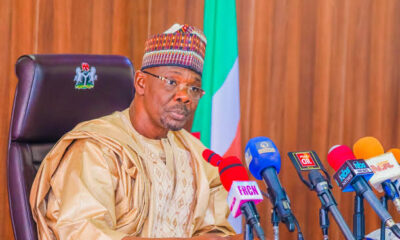News
NUJ, Anambra Govt. bicker over alleged shut down of newspaper

The Nigeria Union of Journalists (NUJ) has criticised Gov. Chukwuma Soludo- led administration in Anambra for allegedly shutting down the state-owned National Light newspaper.
The Chairman, NUJ Anambra Council, Dr Emeka Odogwu, told the News Agency of Nigeria (NAN) on Sunday in Enugu that the latest move by the government remained “an open ill-treatment“ of journalists by the Soludo administration.
He said the latest move also portrayed the state government as one without a human face.
“We frown at the reckless manner in which the National Light newspaper issue is being handled and we urge that the staff be absorbed in the Ministry of Information as anything to the contrary would boomerang.
“The NUJ cannot understand why Soludo’s government was busy employing other workers but cannot allow fewer than 100 workers at National Light newspaper be, even if he does not want to hire more workers or turn around the organisation.
“We are calling on journalists across Nigeria and the world to stand up against the injustice being meted to workers at National Light newspaper who have committed no offence,” he said.
Odogwu said that he reliably gathered that the purported letter closing down the newspaper had been handed to a top management official of the organization on July 20.
Responding, Chief Paul Nwosu, the Commissioner for Information and Public Enlightenment, said there was no directive shutting down the newspaper house.
“I am not aware of what he is saying. What you are saying is new to me.
“If government wants to shut down such an establishment, there will be an official public statement to that effect.
“As at the last Executive Council meeting of the state, we did not discuss any issue concerning the National Light newspaper,” Nwosu said.
News
Woman killed while crossing road in Anambra

The Federal Road Safety Corps (FRSC), Anambra State Sector Command, has confirmed the death of a woman in an accident at Okpoko Market on the Asaba-Onitsha Road.
The Sector Commander, Mr Adeoye Irelewuyi, who confirmed the accident to journalists in Awka on Thursday, said that the woman was hit while she was crossing the road.
He said that the accident, which occurred on Wednesday, involved a commercial tow truck with registration number XA550BMA.
“Eyewitness report reaching us indicates that the truck was towing a vehicle in an uncontrollable speed along the axis.
“The vehicle that was being towed got detached from the tow truck.
“It hit and killed a female adult, who was said to be crossing the road, while the tow truck continued its movement.
“FRSC rescue team came to the scene and took the woman to Toronto Hospital, Onitsha, where she was confirmed dead and her body deposited at the hospital’s mortuary,” he said.
While sympathising with the family of the dead, the sector commander urged motorists, especially tow truck drivers, to exercise a high level of professionalism.
He also urged the drivers to always use standard equipment and avoid speeding.
News
LASG’s maize palliative impactful, says poultry association chair

The Chairman, Poultry Association of Nigeria (PAN), Lagos State Chapter, Mr Mojeed Iyiola, said the state government’s maize palliative to members of the association made a positive impact on the sector.
Iyiola said this in an interview with the News Agency of Nigeria (NAN) on Thursday in Lagos.
“We received about 150,000 tons of maize in February from the Lagos State government as palliative to cushion the effect of high feed prices.
“The major benefit of the palliative is that it actually cushioned the cost of production for most poultry farmers in the state.
“The palliative was beneficial as it made the cost of some poultry produce, especially eggs to drop,” Iyiola said.
He noted that prior to the palliative, a crate of egg was sold between N3,500 and N3,700 at the farm gate, but after the palliative, it now sells between N3,200 and N3,400.
According to the PAN chair, retailers and middlemen who sell from N3,800 to N4,200 do that for their personal gain.
“We have urged our members to sell their eggs at reasonable prices following the receipt of the palliative from the government.
“We appreciate the Lagos State government for the palliative but we also urge the federal government to do likewise, to further reduce the cost of production in the sector.
“This will consequently lead to drop in the prices of all poultry produce across board,” he said.
He said the palliative was shared among financial members of the association at no extra cost.
“As an association we shared the grains equally across PAN’s eight zones in the state equally. We also mandated each zone not the sell even a grain of the maize.
“We, however, considered new poultry farmers who wanted to the join the association as beneficiaries of the palliative,” said Iyiola.
He noted that through the palliative, more poultry farmers were recruited into the association.
“The maize was shared only to poultry farmers and not feed millers, it is the major component of poultry feed formulation,” he said.






















